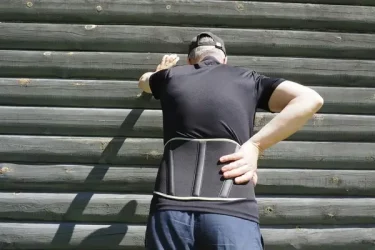Hernia surgery is a common procedure that aims to repair a weakness or opening in the abdominal muscles. Though it can provide relief for those suffering from hernias, as with any operation, there are risks involved. Understanding the benefits and risks of hernia surgery is essential before deciding whether to undergo the procedure.
In this article, we will explore what you need to consider in order to make an informed decision about your health. So let’s dive in and take a closer look at the benefits and potential drawbacks of going under the knife.

Private hernia surgery at a glance:
- Surgery within 4-6 weeks
- Costs £3,299
- Available at range of our UK locations
- Finance options available
Call us on: 0333 060 6126
Types of hernia
Hernia is a common condition that occurs when an organ, fatty tissue, or intestine pushes through a weakness in the muscle walls of the abdominal wall. Hernias can occur in different parts of the body, but they are most common in the groin area.
Before discussing the risks and benefits of hernia surgery, it’s important to understand the different types of hernias that can occur. The most common types of hernias are:
- Inguinal: These hernias occur in the groin area and are more common in men than women
- Umbilical: As per the name, these hernias pop up around the belly button. They can affect infants, children and adults
- Incisional: These hernias occur at the site of a previous surgical incision.
- Hiatus: These hernias occur in the diaphragm and can cause acid reflux and heartburn.
What happens during hernia surgery?
During hernia surgery, the surgeon makes a small incision in the affected area and works to repair the weakened area of the abdominal wall. In some cases, the surgeon may need to remove fatty tissue or repair muscle walls to strengthen the area. If the hernia is in the groin area, the specialist hernia consultant may need to push the bulging tissue back into the abdomen before repairing the weak spot.
The surgery may be performed using traditional open surgery or minimally invasive laparoscopic surgery. This will depend on the size and location of the hernia. The surgery typically takes between one and two hours, and most patients are asleep during the operation.
There are two main types of hernia surgery: open repair and laparoscopic repair:
- Open repair: involves making a cut incision in the skin over the hernia and repairing the hernia through the incision
- Laparoscopic repair: involves making several small incisions and using a thin tube with a camera to repair the hernia.
Both types of surgery have their advantages and disadvantages. Open surgery may be necessary for large hernias or in the event a patient is suffering from a pre-existing medical condition that makes laparoscopic surgery unsafe. The surgery you receive will depend on the location and type of hernia.
Please note that laparoscopic repair is not available at some Practice Plus Group hospitals.
When is hernia surgery recommended?
Surgery is typically recommended when the hernia is causing discomfort or when there is a risk of your hernia becoming strangulated. This can occur when the blood supply to the herniated organ or tissue is cut off. Strangulated hernias can be life-threatening and require emergency surgery.
Benefits of hernia surgery
While hernia surgery may sound daunting, there are several benefits to the procedure. The main ones include:
Relief from pain and discomfort
Among the main symptoms of a hernia are pain and discomfort. These can be eased by surgery if other non-surgical methods prove unsuccessful.
Improved quality of life
After surgery, most patients experience an improved quality of life. This can include better physical function and less pain, enabling you to carry out everyday tasks as normal.
Reduced risk of complications from the hernia
Surgery can reduce the risk of complications associated with the hernia. These can include bowel obstruction which can be life-threatening in severe cases.
Lower risk of tissue strangulation
Strangulation occurs when a portion of the herniated tissue becomes trapped and loses its blood supply. Surgery can reduce the risk of strangulation by repairing the hernia while preventing the tissue from becoming trapped again.
Minimally invasive surgery options
Laparoscopic surgery involves making small incisions and using a thin tube with a camera and instruments to repair the hernia. This approach can result in less pain, shorter hospital stays, and faster recovery times compared to open surgery. Use and effectiveness of this technique depends on the location and type of hernia.
Please note that laparoscopic repair is not available at some Practice Plus Group hospitals.
Open surgery options
For larger hernias or more complex repairs, open surgery may be necessary. This involves making a larger incision to repair the hernia.
High success rates
Hernia surgery has a high success rate when performed by experienced surgeons using modern techniques. Advances in medical technology and surgical methods have allowed for minimally invasive procedures, such as laparoscopic surgeries.
These techniques involve smaller incisions, reduced trauma to the surrounding tissues, and enhanced visualisation of the surgical site. As a result, patients often experience less pain, shorter recovery times, and reduced risk of complications.
Reports of 90 – 99% success rates are common. Mesh repairs, in many cases, offer a smaller chance of hernia recurrence rate than non-mesh repairs.
Short hospital stay and quick recovery times
With thorough post-operative care and follow-up appointments, patients could benefit from a short hospital stay and quick recovery times after their hernia surgery.
Is hernia surgery considered risky?
While the procedure is generally considered safe, as with any surgery, there are associated risks. At Practice Plus Group, all our hernia surgeons boast a wealth of experience and medical qualifications to help ensure your experience is successful.
Risks associated with hernia surgery
As with any surgical procedure, there are risks. These may include:
Infection
As with any surgery, there is a risk of developing an infection. This can occur at the site of the incision or deeper within the body. In the event an infection occurs, it can be managed using medication.
Bleeding
There is a risk of bleeding during and after the surgery. This can range from minor to severe. If you experience heavy bleeding following your surgery, you should seek medical attention immediately.
Damage to surrounding structures
During surgery, there is a small risk of unintentionally damaging nearby structures, such as blood vessels, nerves, or organs.
Bowel obstruction
Hernia surgery can lead to a blockage of the intestines, which can cause nausea, vomiting, and abdominal pain. These occurrences are extremely rare.
Nerve damage
In rare cases, surgery can lead to damage to the nerves. This can cause numbness, tingling, or weakness in the affected area.
Adverse reactions to anaesthesia
There is a risk of having an adverse reaction to the anaesthesia used during the surgery.
At Practice Plus Group, we take these risks very seriously and work hard to mitigate them through thorough preoperative evaluation, highly skilled surgeons, and attentive post-operative care.
Factors that may increase the risk of complications
Certain factors may increase your risk of complications from hernia surgery. These include:
- Age: older patients may be at higher risk of complications
- Obesity: excess weight can make surgery more difficult and increase your risk of complications
- Smoking: smoking can increase your risk of complications and slow down the healing process
- Chronic illness: certain chronic illnesses, such as diabetes, may increase your risk of complications
- Previous surgery: if you have had previous abdominal surgery, you may be at higher risk of complications from hernia surgery
- Type of hernia: certain types of hernias (such as inguinal hernias) may be associated with a higher risk of complications from surgery
- Type of surgery: the type of surgery performed can also affect the risk of complications. For example, laparoscopic surgery may be associated with a lower risk of complications compared to open surgery. Please note that laparoscopic repair is not available at some Practice Plus Group hospitals.
How to reduce the risks of hernia surgery
To reduce the risk of complications, it’s important to follow your surgeon’s instructions carefully before and after your surgery.
Here are some steps you can take to reduce the risks of hernia surgery:
- Stop eating and drinking: your surgeon will likely instruct you to stop eating and drinking for a certain period before surgery. This is to ensure that your stomach is empty during the procedure, which reduces the risk of complications
- Medical evaluation and testing: your surgeon may order various tests (such as blood tests or imaging scans) to evaluate your overall health and ensure you are a good candidate for surgery
- Medication management: your surgeon will provide instructions on which medications to stop taking before surgery and which medications you can continue to take
- Fasting and bowel preparation: your surgeon may ask you to follow a specific diet or take bowel preparation medication to ensure you’re completely empty before surgery
- Anaesthesia options: your surgeon will discuss the different types of anaesthesia options available and help you determine which one is best for you.
Alternative treatment options
In some cases, surgery may not be the best option for treating a hernia. Below are some alternative treatment options you may wish to consider:
- Watchful waiting: if your hernia is small and not causing significant symptoms, your surgeon may recommend a course of monitoring. If the hernia gets worse, surgery may be considered
- Lifestyle changes: making certain lifestyle changes, such as losing weight, quitting smoking, and avoiding heavy lifting may help reduce the risk of your hernia getting worse
- Supportive garments: wearing a supportive garment, such as a hernia belt or truss, may help relieve symptoms and prevent the hernia from worsening
- Non-surgical medical management: your surgeon may recommend medication or physical therapy to help relieve symptoms associated with the hernia.
Patient testimonial
Don’t just take our word for it though! Peter Sykes was suffering with hernia discomfort for months before opting for surgery.
“All the staff were brilliant; they were polite, helpful and couldn’t have done more.”
“I can’t recommend Practice Plus Group enough. Everything they did was excellent.”
Peter Sykes, Practice Plus Group hernia patient
Practice Plus Group’s approach to care
We are committed to providing high-quality, patient-centred care for hernia surgery. Treatment is available via three different routes: Self-pay, insured and through the NHS.
Our experienced surgeons are skilled in both open and laparoscopic surgery and use state-of-the-art facilities and equipment to ensure the best possible outcome for our patients.
Please note that laparoscopic repair is not available at some Practice Plus Group hospitals.
Contact us to schedule a consultation with one of our certified surgeons and consultants.
Fill in a booking consultation form here or give us a call at 0333 060 3482.





